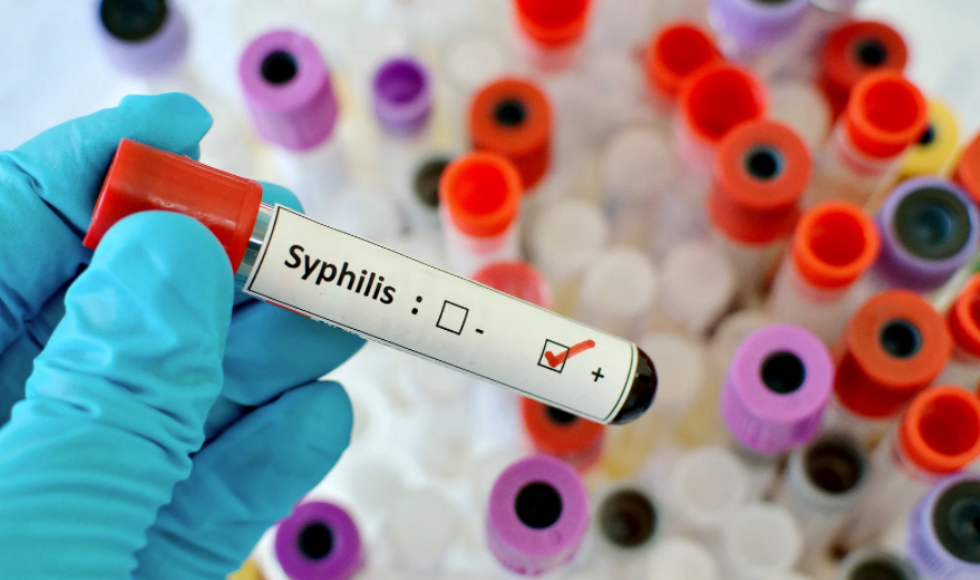Congenital syphilis: What you need to know

McMaster University Associate Professor Karen Lawford says more testing needs to be done to help pregnant people and their children as cases of congenital syphilis spike in Canada.
March 12, 2024
Health-care professionals are sounding the alarm over an increasing number of syphilis cases in Canada, including among newborn babies.
The Public Health Agency of Canada (PHAC) released a statement in early Feb, drawing attention to the dramatic rise in cases involving syphilis. PHAC noted that in 2022 – the most recent year for available data – there were 117 congenital syphilis cases, marking a 599 per cent increase since 2018.
Karen Lawford, PhD is an associate professor with McMaster University’s Midwifery Education Program. We spoke with Lawford, a registered midwife and an Anishinaabeg midwife, about congenital syphilis, how it spreads and how to identify the early warning signs.
What is syphilis?
Syphilis is a bacterial infection. The infection can also spread to a baby during pregnancy. This is called congenital syphilis. The most common form of syphilis stems from a variant called treponema pallidum.
The good news is that syphilis is treatable with antibiotics, and if caught early enough, curable. Typically, penicillin is used to combat syphilis, but there are alternative treatments for those with a penicillin allergy.
How can someone get syphilis?
There are two ways someone can get a syphilis infection.
The syphilis bacteria can be passed onto another person through intimate contact. If there is an open syphilis sore and there is physical contact with another person, the bacteria can spread. Intimate contact includes touching vaginal, anal, and oral areas.
If a pregnant person has syphilis, it can be passed along to the fetus. When a baby is born and has syphilis, it is termed congenital syphilis. Sometimes, a newborn does not show signs or symptoms. But if there is a syphilis infection, within the first few months, the infection will become visible. All new sores or rashes on a newborn must be investigated.
You cannot get syphilis from touching objects like toilet seats and door handles or from swimming pools and hot tubs.
What are the stages and warning signs of syphilis?
A blood test is used to determine if someone has syphilis.
Syphilis has four stages. The first stage can look like an open sore on the mouth, genitals, nipples, or fingers. The open sore is usually painless.
In the second stage, a rash may break out. The rash can appear anywhere on the body, including the feet, back, chest, or on the head. It is important that any new rash is examined by a health-care professional.
In the third stage, there are no visible signs or symptoms of a syphilis bacterial infection.
The fourth stage of syphilis is not commonly seen in the medical community because of active treatment of syphilis in the first and second stages of infection. The fourth stage can take 10 to 40 years to develop. At this stage, the heart, brain, and other organs can have decreased functioning.
It is important to note that antibiotics can be used at all four stages.
Why is Canada experiencing a rise in cases?
Cases of syphilis have been on the rise in Canada since 2011. A report released by the federal government in 2022 provided insight on trends involving syphilis.
Previously, syphilis cases have been the highest among males. But the report found the highest increase in syphilis cases among females. Similar trends have been seen in Australia, the U.K, and the U.S. The exact reasons for the rise in syphilis are not known, however, social and structural determinants of health play a critical role in the uneven occurrence of all diseases, including syphilis, which contribute to disparities in health.
There is a successful antibiotic treatment for the syphilis bacteria. More testing for syphilis bacteria is needed so we can treat this infectious disease and decrease its spread.
Stigmatization and shame in having syphilis or any disease that is associated with sexual intimacy continue to be a major barrier. This shame is harming, and, in some cases, killing people. We must counter the undeserved shame of syphilis and all infections that are spread during intimate encounters with informed discussions that maintain our dignity and humanity.
Edited and compiled by Adam Ward


